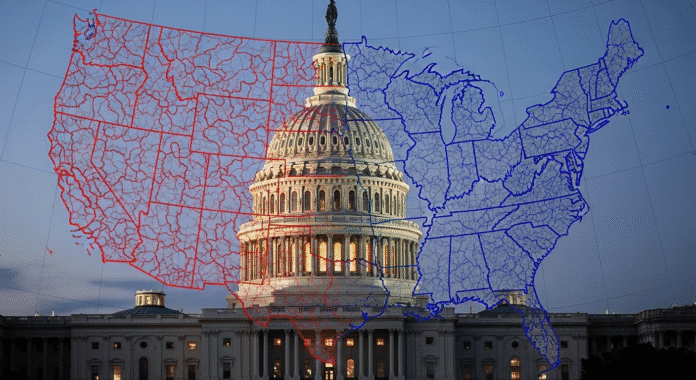Texas Democrats Flee to Block GOP Redistricting: What’s at Stake for 2026
How a Texas Standoff Over Redistricting May Shape National Elections
The dramatic move by Texas Democrats to leave the state—and thereby block a quorum—signals more than a local standoff. It is a flashpoint in the national battle over redistricting and partisan gerrymandering. The GOP-backed plan, which could flip five Democratic-held Congressional seats and cement a Republican majority in the 2026 midterms, has ignited fierce debates about fairness, democratic integrity, and the proper role of state versus federal standards in drawing electoral boundaries.
Understanding the Texas Redistricting Plan
What the GOP Proposal Entails
Texas lawmakers, led by Governor Greg Abbott, have put forth a redistricting plan aimed at redrawing Congressional maps to favor Republican candidates. The proposal would see five seats shift from Democratic to Republican control, potentially increasing GOP victories in Texas from 27 to 30 out of 38 districts as observed in recent electoral trends. The plan strategically targets urban areas such as Austin, Dallas, and Houston—strongholds for Democratic voters—while also redrawing boundaries in South Texas to dilute minority influence. Proponents argue that the maps are a response to demographic shifts; critics see an effort to manipulate electoral outcomes and undermine fair representation.
Racial and Demographic Ramifications
Although the proposal creates two majority-Black districts and boosts the number of majority-Hispanic districts to eight, opponents contend that the changes merely fragment rather than empower minority communities. Civil rights advocates warn that such adjustments may violate the Voting Rights Act by diluting the electoral power of these communities. This contention has spurred legal challenges and fueled nationwide scrutiny over the balance between demographic representation and partisan advantage.
Political Resistance and Legal Maneuvers
In an unprecedented move, Texas Democrats fled the state to prevent a quorum that would allow the GOP plan to pass. This tactic, though controversial, underscores the deep-seated concerns among Democrats about partisan redistricting undermining voter confidence. Governor Abbott’s threats to issue civil arrest warrants for absent lawmakers have only intensified the debate, pitting executive power against legislative accountability and raising questions about the limits of state authority in redistricting matters.
Gerrymandering’s National Impact
The Broader Battle Over Electoral Maps
Gerrymandering—the manipulation of electoral boundaries to favor one party—has long distorted American politics. Texas’s redistricting efforts mirror similar controversies in states like Ohio, Missouri, and even blue states like New York, where partisan advantages have at times overridden the spirit of fair representation. In many red states, strategies like “packing” (concentrating opposition voters into a few districts) and “cracking” (splitting voters across many districts) are common tactics designed to minimize the electoral impact of Democratic and minority communities.
Stakes for the 2026 Midterms
The upcoming 2026 midterm elections hang in the balance as redistricting battles intensify across the country. With the GOP’s slim majority in the U.S. House potentially bolstered by as many as five additional seats from Texas, the partisan balance could shift dramatically. Democratic leaders and grassroots activists warn that a Republican stronghold on redistricting will not only skew electoral outcomes but also jeopardize critical policies on healthcare, education, and social services. As Congressman Paul Tonko put it, “Our democracy is at risk when partisan interests trump the need for fair, independent redistricting—this is a fight for the very soul of our electoral process.”
The Push for Federal Redistricting Reform
H.R. 1 and Its Ambitious Vision
H.R. 1, widely known as part of the “For the People Act,” encapsulates the push for a wholesale reform of American democracy, including redistricting. The bill proposes that all states employ independent redistricting commissions (IRCs) composed of equal parts Democrats, Republicans, and independents. These commissions would adhere to strict criteria—compactness, contiguity, and respect for communities of interest—to craft fair and transparent electoral maps. By banning overt partisan gerrymandering and mandating public input, H.R. 1 seeks to level the playing field across the nation.
Political Dynamics and Obstacles
While the vision behind H.R. 1 has galvanized Democrats and reform advocates alike, its progress is mired in political gridlock. Senate rules, particularly the filibuster that requires 60 votes to pass most legislation, have stalled the bill. Republicans argue that federal oversight intrudes on state sovereignty, insisting that every state should control its own maps. This ideological tug-of-war, coupled with entrenched partisan interests, means that a national overhaul of redistricting practices may not come to fruition before the 2026 midterms.
The Effectiveness of Independent Redistricting Commissions
States such as California, Arizona, and Michigan, which have embraced independent commissions, offer a model for mitigating partisan bias. These IRCs have generally produced more competitive and representative districts. However, their success depends on robust design and unwavering adherence to impartiality. While they are not a panacea for all redistricting woes, independent commissions represent a promising step toward restoring public trust in an electoral process too often criticized for partisanship.
Legal Barriers and the Role of the Courts
Court Rulings That Shape Redistricting
Federal and state courts have increasingly become battlegrounds in the fight over gerrymandering. The landmark U.S. Supreme Court decision in Rucho v. Common Cause (2019) ruled that partisan gerrymandering constitutes a “political question” beyond federal judicial review, effectively shifting redistricting disputes to state courts. In Texas, the state Supreme Court has backed the GOP’s redistricting plan, making legal intervention unlikely unless clear violations of the Voting Rights Act emerge. Meanwhile, states like Ohio have seen their courts strike down skewed maps on constitutional grounds, reflecting a patchwork of legal outcomes that depend largely on state-level governance.
State Constitutional Amendments and Their Power
Some states, notably Ohio and New York, have amended their constitutions to explicitly counter partisan gerrymandering. These provisions serve as powerful checks on the legislature’s redistricting authority. However, their effectiveness is often limited by the political composition of state courts and legislatures, which can sway interpretations of fairness. Thus, while legal challenges continue to shape redistricting outcomes, the battle over maps remains deeply politicized both in the courtroom and on the floor of legislatures.
Public Sentiment and Grassroots Mobilization
Voter Perspectives and Town Hall Activism
The controversy over redistricting has energized voters across the country. Polls indicate a prevailing skepticism toward gerrymandering, with many Americans—especially urban and suburban voters—expressing concern about its impact on democratic fairness. In Texas, record attendance at town hall meetings and grassroots rallies has underscored the public’s demand for transparency and accountability. Citizens are increasingly vocal, leveraging social media and local organizing to advocate for independent redistricting and contest partisan map-drawing.
Grassroots Impact on the Redistricting Debate
Local activism has become a cornerstone of the national pushback against gerrymandering. From heated town halls in Plattsburgh, where nearly 2,000 constituents gathered despite adverse weather, to social media campaigns that expose the tactics behind partisan map-drawing, grassroots efforts are reshaping the redistricting discourse. These movements not only challenge the status quo but also press lawmakers to consider reform measures such as H.R. 1 and state constitutional amendments that promote fair representation.
Counterarguments and the “Fight Fire with Fire” Debate
Is It Hypocritical for Democrats in Blue States?
Critics accuse Democrats in traditionally blue states like New York of hypocrisy when they consider drastic redistricting measures to counter Republican moves in red states. Historically, Democrats have championed the use of independent redistricting commissions to prevent partisan manipulation. However, faced with GOP tactics in Texas, some Democratic leaders argue that aggressive redistricting is necessary to prevent an uneven playing field. This “fight fire with fire” approach, while understandable as a political tactic, risks normalizing gerrymandering on both sides and may ultimately erode public trust in democratic institutions.
Weighing the Risks and the Case for National Standards
Aggressive redistricting efforts, however, come with significant dangers. They can trigger prolonged legal battles and provoke a cycle of retaliation that deepens partisan divisions. Critics warn that tit-for-tat gerrymandering compromises the institutional integrity of elections. Rather than allowing states to engage in endless tit-for-tat map drawing, many experts and advocates argue that the only sustainable solution is the establishment of national redistricting standards. Uniform, federal criteria would ensure fairness, reduce political polarization, and restore trust in the electoral process.
A Critical Juncture for American Democracy
The Texas redistricting standoff is more than a regional dispute—it is a bellwether for the future of American democracy. With the 2026 midterms looming, the battle over electoral maps could redefine Congressional power, affect legislative agendas, and shape public policy on healthcare, education, and beyond. Whether through federal initiatives like H.R. 1, state constitutional reforms, or grassroots mobilization, the demand for fair redistricting is clear. As the debate intensifies, citizens are urged to stay informed and involved. The future of our democracy depends on ensuring that every vote counts and that partisan politics do not compromise the integrity of our electoral process.
What do you think? Should states engage in aggressive redistricting as a countermeasure, or is it time to embrace uniform national standards for fair representation? Share your thoughts and join the conversation—our democracy depends on it.




